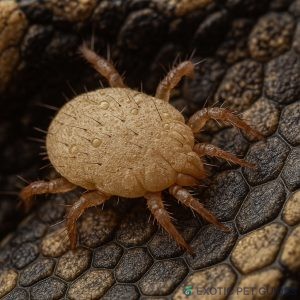Introduction
Argentine Tegus are hardy reptiles, but like any pet, they’re still prone to health issues—especially in captivity. Understanding common health problems, early warning signs, and prevention tips can help your tegu live a long and healthy life.

1. Metabolic Bone Disease (MBD)
Cause: Calcium deficiency or lack of UVB lighting
Symptoms:
- Soft or swollen jaw
- Limping, tremors
- Lethargy, curved limbs
Prevention:
- Provide high-quality UVB light (10.0 strength)
- Dust food with calcium + D3 3 times per week
- Ensure proper diet-to-supplement balance

2. Obesity
Tegus love to eat—but overfeeding, fatty foods, or low activity leads to weight gain.
Symptoms:
- Fat rolls under armpits
- Lethargy or reluctance to move
- Labored breathing
Prevention:
- Feed on a schedule (not daily for adults)
- Provide a large enclosure for exercise
- Limit fatty meats (e.g., ground beef)

3. Dehydration
A very common issue in arid or poorly maintained enclosures.
Symptoms:
- Wrinkled skin, sunken eyes
- Poor appetite
- Dry feces
Prevention:
- Keep humidity between 60–80%
- Offer clean soaking dish daily
- Mist enclosure or use a humidifier
4. Respiratory Infections
Cause: Cold or damp environments
Symptoms:
- Wheezing or clicking when breathing
- Excess mucus from mouth/nose
- Loss of appetite, lethargy
Prevention:
- Maintain proper basking temps: 100–110°F
- Keep enclosure clean and dry
- Avoid drafts or enclosure near cold windows

5. Parasites (Internal and External)
Symptoms:
- Unexplained weight loss
- Visible mites (tiny black/red dots)
- Runny or irregular feces
Prevention:
- Quarantine new reptiles
- Clean enclosure regularly
- Fecal test annually with exotic vet

6. Shedding Issues
Cause: Low humidity or poor hydration
Symptoms:
- Retained shed on toes or tail tip
- Dull or flaky skin
- Swollen digits
Prevention:
- Provide a humid hide
- Soak or mist tegu during shedding
- Gently assist with shedding skin using wet cloth (if needed)

7. When to See a Vet
Seek an exotic vet immediately if your tegu shows:
- Sudden weight loss
- Refusal to eat for more than 10 days
- Visible wounds or infected skin
- Prolapsed organs or bloody stool
🧪 Annual fecal tests and wellness exams help catch early issues before they become serious.
Final Tips for Tegu Health
- Provide a clean, enriched environment
- Offer proper diet and lighting
- Handle with care to reduce stress
- Monitor weight, poop, and shedding
Healthy tegus are active, curious, and alert. By catching problems early, you can prevent suffering and vet bills later.